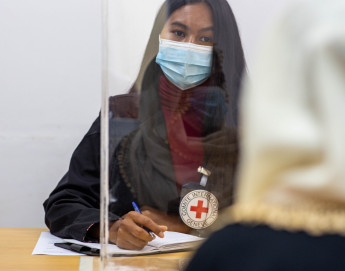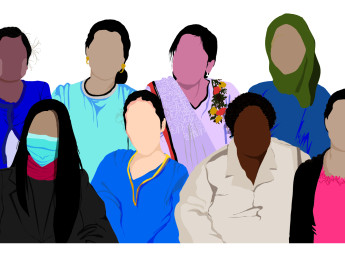
Myanmar: Women who code — breaking boundaries

Think of the amount of data we deal with – data about clashes, casualties and other consequences of violence. All this information has to be stored, sorted, managed and analysed in a way that makes it useful and informs our humanitarian response.
In Myanmar, a pilot project to rethink how we deal with data is nearly three years old now. This 'Data Unit' is the first of its kind in the International Committee of the Red Cross (ICRC). Its job has evolved, as has the data landscape in Myanmar, adapting not just to COVID-19 but also the 2021 changes in the political situation.
From a room in a Yangon office, the small team that works in this complex coding ecosystem continues to break biases.
"I would like to pave my own path"
Shwe Yee Thet codes in the computer programming language known as 'R', as do all her coding colleagues in the Data Unit.
She first came to know the ICRC when she saw vehicles with the red cross emblem pass nearby her home, en route to help others. "As I watched them, I began to feel that I wanted to be part of an organization that helps the community," Shwe Yee says.
I like to study data, and I want to apply that to the public good – that's why I chose the data and humanitarian sector.
Shwe Yee Thet
For Shwe Yee, the aim of her work is to enable colleagues to do their vital work even better. If a health team wants to provide emergency aid to a community in Myanmar, they might need to study data to understand health conditions in the area and determine what kind of aid will actually help the most. Helping others to make these evidence-based decisions is at the core of Shwe Yee's work.
But coding is a skill set in a field that has traditionally seen men fill more roles than women, and this is only beginning to change, particularly in the humanitarian sector. That's why working in a female-led, female-majority team of coders from Yangon busts a trend and breaks a bias.
"Whatever background you're from, if you are interested in coding, I would urge you to try. It is not just for men," Shwe Yee says. While there are always challenges along the way, "I would like to pave my own path," she says.
Watch the video
"There is nothing that a woman can't do"
Htet Htet Aung likes Japanese anime, gardening and code.
Interested in computers from a young age, she focused her studies on this rapidly changing sector, even after joining the ICRC. Eventually, this interest and skill set led her to the ICRC's Data Unit.
Starting a new project requires thinking about what it should look like, how the code should be written, what the team wants to achieve and how they plan to get there, as well as potential coding error. "When we face coding error, it's like an alien language that we need to understand," Htet Htet says. "Only then can we solve the problem – it requires a lot of focus."
Htet Htet codes in many programming languages: Java, VB Net, PHP and R. Using these coding languages, one can type out all sorts of intricate instructions. These instructions – lines and lines of code – automate the programmes that many of us rely on for all sorts of functions each day. Google is estimated to run using two billion lines of code.
Working with data is engaging and challenging but is a field that still struggles to break free from traditional gender norms and expectations.
Htet Htet wants to see more women pursuing careers in what they enjoy doing and are interested in.
Don't be put off by people saying it's not suitable for a woman – if you're interested and enjoy it, go for it.
There is nothing that a woman can't do.
Htet Htet Aung
"Diversity in all sectors"
Alejandra Moreno Ramirez thinks of coding as a puzzle. Leading the Data Unit of the ICRC's Yangon delegation hasn't taken away from the fact that coding is, at its heart, fun.
"It's like a very intricate puzzle, or a bit like a game," she says. "So, as an activity, it's already fun and challenging – which is a good thing."
When it comes to coding, Alejandra speaks R and a little bit of a language called Python – "1.3 languages," as she describes it.
Mindfulness of the value of diversity – not just for the team, but also for the data – is at the forefront of Alejandra's approach to the Data Unit. Coding can carry the trace of biases and preconceptions, like any form of communication. The more diversity in the teams writing the code, the less risks posed by biases appearing in the coding instructions.
Having a diverse team has definitely added value because we've seen different skills and personalities come through. It's extremely important to have diversity in all sectors.
Alejandra Moreno Ramirez
For Alejandra, that means encouraging an equitable environment to allow for a diverse workforce. It's a question of fairness and opportunity.




